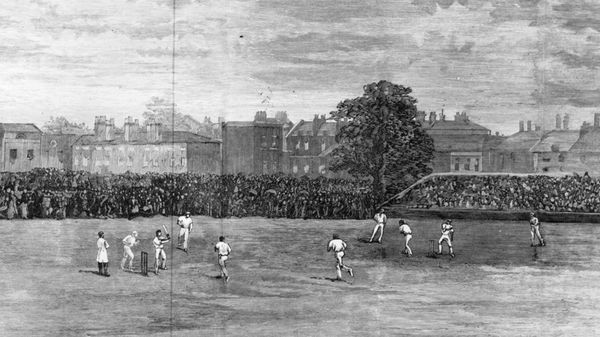

The 2015 Ashes test at Edgbaston is one of the Shortest Ashes Games in the history of the Ashes and also Test match cricket.
It was just Day 3, as England cruised to an eight-wicket victory against Australia and gained a crucial 2-1 advantage as the third Test of the Ashes came to an end. A fine bowling performance by England, led by James Anderson in the first innings and Steven Finn in the second, meant that they had to make just 121 in the final innings to seal a memorable win. Such was the dominance of the England bowlers, that at one point of time, it looked like Australia would be bowled out for the second time in the game on the second day itself, but Peter Neville stood up and showed some resistance and subsequently took the game to the third day.
Had this game been wrapped up in two days time, it would have been the first time since August 1890, that the men from Down Under lost a game in just two days.
ADVERTISEMENT
Article continues below this ad
Here, we take a look at some of the shortest Ashes games played between England and Australia, most of which took place in the 19th century.
Shortest Ashes Games in Cricket

via Getty
An illustration of the 1882 Oval Test! (Courtesy – Getty Images)
August 28, 1882 – The Oval
Australia 63 & 122, England 101 & 77. Australia won by 7 runs.
This game is most famous for the burning of the bail, which marked the beginning of the Ashes. The match took place at the Oval and lasted just two days with Australia pulling off a major upset against the English and thus marked the beginning of the most famed rivalry in cricket history.

via Imago
The iconic obituary which prompted the start of the Ashes!
Frederick Spofforth picked up a total of 14 wickets, with seven in each inning and triggered a mighty English collapse in the second innings, which helped Australia script a famous victory. Needing just 85 runs to win, England looked all set to clinch victory as they stood at 51/2 with WG Grace on the crease.
However, a quick succession of wickets followed, but still only 19 runs were required with five men still to bat. But then came a horrendous collapse as England’s last five batsmen made a combined total of just four runs and Australia bowled England out, to clinch a seven-run victory. It may have been one of the shortest Ashes games but it set the ball rolling for a lifelong rivalry.
July 16, 1888 – Lord’s Cricket Ground
Australia 116 & 60, England 53 & 62. Australia won by 61 runs.
The Ashes of 1888 were quite peculiar. It featured just three games in total, all of which ended in a matter of two days! Here, we present the first game of this series, where the Aussies were victorious after defeating England by 61 runs, which doesn’t seem much. But after a quick look at the scores, it looks like a rout!
Australia won the toss and chose to bat, and were reduced to 82/9, but a last-wicket stand of 34 runs between Jack Edwards and number 11 J. J. Ferris meant that Australia’s innings closed at 116, which would be the highest total of the game. England were 18/3 at the close of Day 1 and were then bowled out for 53 with number ten batsman Johnny Briggs top-scoring with 17.

via Imago
J. J. Ferris, the Aussie hero!
Australia looked to have the upper hand but were reduced to an unbelievable 18/7! J.J. Ferris once again came to their rescue and managed to conjure up some runs to take Australia to a total of 60.
Chasing 124, England might have gone in with some hopes of getting the win. However, they were skittled out for a paltry 62, with just two batsmen reaching double figures. Two Aussie bowlers took fifers, with Charlie Turner being one and the second being none other than J.J. Ferris, as he ended with the figures of 5/26! it was one of the shortest Ashes Games and one of the lowest scores for England in Ashes history.
August 13, 1888 – The Oval
Australia 80 & 100, England 317. England won by an innings and 137 runs.
In the very next match, England came up with a spectacular two-day victory of their own and levelled the series at 1-1. Like the last game, it was Australia who won the toss and batted first, and were all out for a low score.

via Imago
Bobby Abel, England’s top scorer with 70.
They were bowled out for 80 after a five-wicket haul by English left-arm spinner Johnny Briggs and were looking to do what they did in the last game – bowl England out cheaply. Alas, that did not happen this time as England recovered from 165/5 to finish off at a solid 317 after a strong performance by the middle and lower order.
England then produced a splendid bowling performance to claim victory after taking all Aussie wickets for just 100 runs. Billy Barnes finished with figures of 5/32 and England were back in the series.
August 11, 1890 – The Oval
Australia 92 & 102, England 100 & 95/8. England won by two wickets.
Next up, we bring you a thriller as England beat Australia by the slimmest of margins in the 1890 Ashes. Again, it was Australia who won the toss and opted to bat, and put up a total of 92 as Fred Martin, a pacer who was making his debut, claimed six scalps.
ADVERTISEMENT
Article continues below this ad
England were then bowled out for just 100 as Day 1 came to a close. But that was not all. At stumps, Australia were already 5/2, which meant that a massive 22 wickets fell on the first day itself! Martin ripped through the Aussie lineup once again and collected six wickets, and became the first bowler to take 12 wickets on debut. Australia ended on 102, giving England 95 to chase. This is why this particular match is one of the Shortest Ashes Games in the series’ history.

via Imago
Fred Martin, who took 12 wickets on debut!
The match was far from over as England were quickly reduced to 32/4 but a strong partnership meant that England could smell victory as they took England to 83. However, there was a twist in the end as Australia were back in the game as England were pegged back to 86/7 and then 93/8.
ADVERTISEMENT
Article continues below this ad
Two runs to win, with two wickets in hand. The pressure was intense as the Aussies bowled five maidens in a row. Then, the English batsman stroked the ball to cover point and rushed for a single. The fielder there, Jack Barrett could have easily run out either batsman, but made a wild throw in anxiety and the batsmen ran the second run on the overthrow. A crazy end to a crazy game!
As can be seen above, pretty much all the Shortest Ashes Games were in the late 1980s.
ADVERTISEMENT
ADVERTISEMENT
ADVERTISEMENT
ADVERTISEMENT

